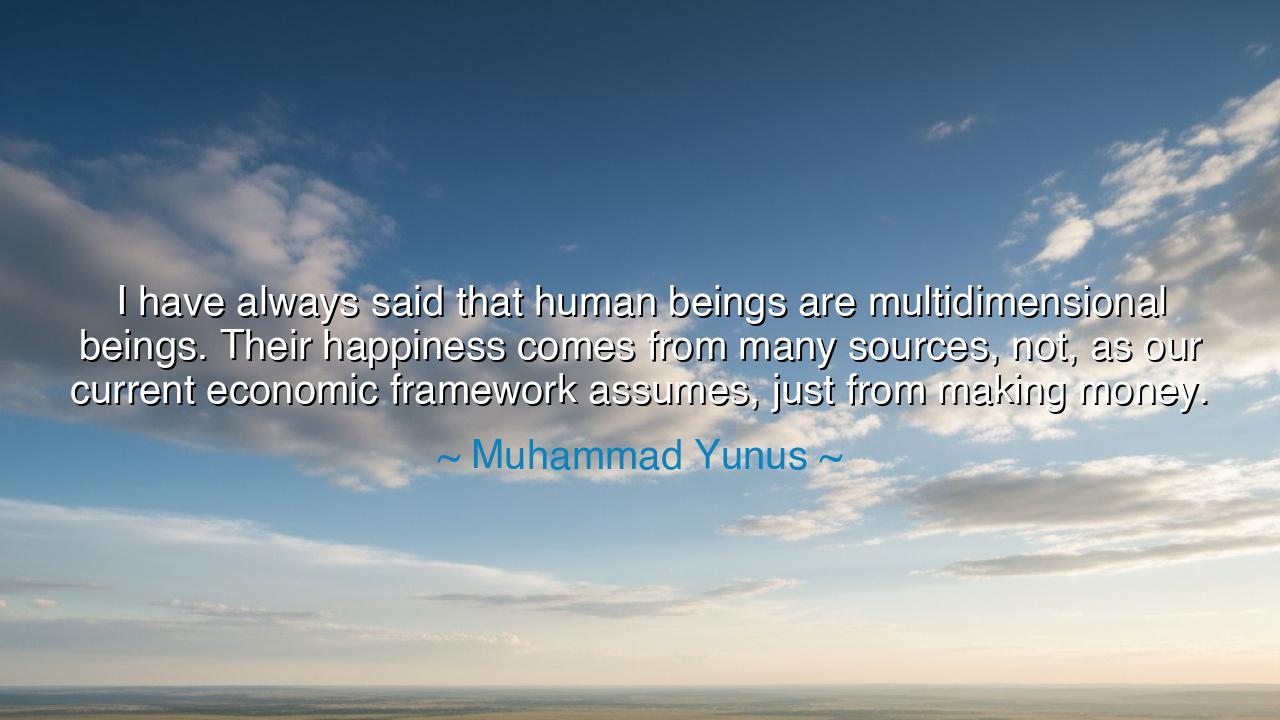
I have always said that human beings are multidimensional beings.
I have always said that human beings are multidimensional beings. Their happiness comes from many sources, not, as our current economic framework assumes, just from making money.






The words of Muhammad Yunus, “I have always said that human beings are multidimensional beings. Their happiness comes from many sources, not, as our current economic framework assumes, just from making money,” resound like a call to awaken the sleeping heart of humanity. In these words, the Nobel laureate and founder of the Grameen Bank speaks not only as an economist but as a sage—one who sees beyond numbers and markets into the soul of mankind. He reminds us that the measure of a human being cannot be written in coins or calculated in profit, for happiness is woven from many threads: love, purpose, compassion, creativity, and belonging. The multidimensional nature of man, he declares, is the truth that modern civilization has forgotten in its blind worship of wealth.
To understand the depth of Yunus’s insight, one must look at the world he sought to heal. He was born in a time and place where poverty was not an abstraction but a daily wound upon humanity. In Bangladesh, he saw mothers with no means to feed their children, artisans unable to buy the tools to sustain their craft, and entire villages trapped in cycles of despair. The economists of the world, armed with theories and graphs, declared that prosperity would “trickle down” through wealth, that money was the root of happiness. But Yunus saw differently. He saw dignity where others saw only poverty. He saw that joy came not from riches, but from empowerment—from being useful, creative, and free. Thus, he founded the Grameen Bank, lending small sums to the poor without collateral, trusting in their integrity and ability. What he proved to the world was profound: that human beings, when given opportunity, seek not greed but fulfillment.
In saying that people are multidimensional beings, Yunus speaks to the ancient truth that man is both body and spirit, both creator and caretaker. The current economic framework, as he laments, treats humanity as a single function: the producer and consumer of goods. It assumes that all joy flows from acquisition, that the pursuit of money will lead to the satisfaction of the soul. But history has shown that this is a mirage. Wealth without purpose breeds emptiness; abundance without gratitude leads to despair. The ancients knew this well. The philosophers of Greece, the sages of India, and the mystics of every age have said the same: man cannot live by bread alone. His happiness depends upon harmony—between his labor and his conscience, his outer success and his inner peace.
Consider the example of Emperor Ashoka, ruler of ancient India. He conquered vast territories, gathered immense riches, and became the mightiest king of his age. Yet after the bloody conquest of Kalinga, he looked upon the fields of the dead and felt no triumph, only sorrow. He realized that all his power and wealth could not give him peace. So, he turned to the path of compassion, embracing the teachings of Buddha, dedicating his life to building schools, hospitals, and roads, and spreading the message of kindness and nonviolence. His true happiness began not when he conquered others, but when he served them. In this transformation, we see the eternal truth that Yunus speaks of: happiness is born not from possession, but from purpose.
Modern civilization, however, has lost its way in a labyrinth of consumption. It measures progress in profit, success in accumulation, and joy in possession. But Yunus warns us that this one-dimensional vision of man leads only to imbalance. A society that worships wealth above wisdom will grow rich in things but poor in spirit. It will produce abundance without harmony, and innovation without compassion. To reclaim our multidimensional nature, we must reawaken the parts of ourselves that have been silenced—the artist, the dreamer, the giver, the friend. We must remember that life’s truest wealth lies not in what we earn, but in what we contribute, create, and love.
Yunus’s words are not a rejection of money, but a reordering of values. Money is a tool, not a god. It can build homes or destroy nations, depending on the hand that wields it. What he teaches is balance: to earn honestly, but also to give freely; to build wealth, but also to build character. For the multidimensional being seeks not only survival, but meaning. He knows that joy multiplies when shared, that the richest man is not the one with the most possessions, but the one whose life enriches others.
So, my listener, take this teaching to heart: do not measure your life in currency, but in contribution. Seek happiness in many forms—in learning, in kindness, in creation, in love. Cultivate your soul as diligently as your career. Make time for silence, for reflection, for service. And when the world tells you that success is only what can be counted, remember the words of Muhammad Yunus, who lifted millions not by giving them wealth, but by restoring their dignity.
For the wise know this: man was not born to be a machine of profit, but a vessel of light. His happiness is not a product of what he owns, but of what he becomes. Therefore, live fully, live deeply, live as a multidimensional being—and you shall find the joy that no fortune can ever buy.






AAdministratorAdministrator
Welcome, honored guests. Please leave a comment, we will respond soon